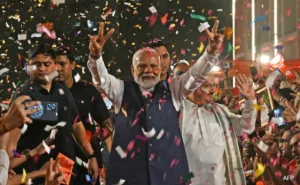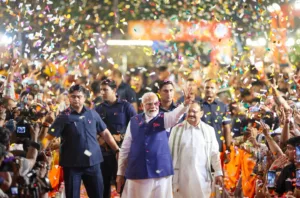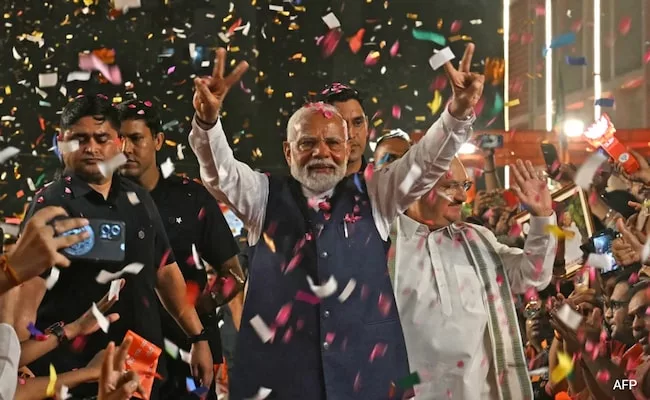
PM Modi’s Oath Ceremony: On the evening of June 9, 2024, the grounds of Rashtrapati Bhavan witnessed a historic event as Narendra Modi was sworn in for his third consecutive term as Prime Minister of India. The ceremony was not just a political event; it was a moment that captured the essence of India’s democratic spirit, its diversity, and its unwavering belief in leadership that has the potential to shape the future of the nation. This blog delves into the intricacies of the event, the significance of Modi’s continued leadership, and the implications for India’s domestic and international policies.
The Significance of the Event
The oath-taking ceremony of a Prime Minister in India is a momentous occasion that symbolizes the peaceful transition and continuity of power in the world’s largest democracy. Narendra Modi’s swearing-in for a third term is particularly significant for several reasons:
- Historical Context: Modi joins the ranks of Jawaharlal Nehru and Indira Gandhi as the only Prime Ministers to serve three consecutive terms. This places him in a unique position in Indian political history, highlighting the trust and confidence that the electorate has placed in his leadership.
- Political Stability: Modi’s re-election signifies a period of political stability, which is crucial for economic growth, foreign policy continuity, and social cohesion. His leadership has been marked by decisive governance and ambitious initiatives, and his continued tenure promises further consolidation of these policies.
- National and Global Implications: The event was closely watched not just within India but globally. Modi’s policies have significantly impacted India’s standing on the world stage, and his third term is expected to reinforce and expand India’s role in global affairs.
The Ceremony: A Blend of Tradition and Modernity
The oath ceremony was a meticulously planned event that reflected India’s rich cultural heritage while embracing modern political dynamics.
The Venue: Rashtrapati Bhavan
The Rashtrapati Bhavan, the official residence of the President of India, served as the majestic backdrop for the ceremony. Its grandeur and historical significance added to the solemnity of the event. The sprawling Mughal Gardens, the iconic forecourt, and the grand architecture provided a fitting venue for such a significant occasion.
The Dignitaries
The guest list was a testament to the event’s importance. It included leaders from various political parties, dignitaries from across the globe, business magnates, cultural icons, and members of the diplomatic corps. The presence of foreign leaders underscored India’s growing influence on the world stage and the global interest in its leadership.
The Rituals and Formalities
The ceremony began with the arrival of the President of India, followed by the National Anthem. Narendra Modi took his oath of office and secrecy administered by the President. The event was marked by traditional Indian rituals, including the lighting of the ceremonial lamp, which symbolizes the dispelling of darkness and the ushering in of a new era.

Modi’s Speech: Vision for the Future
In his address to the nation post the oath-taking, Modi outlined his vision for the future, focusing on several key areas:
- Economic Growth and Development: Modi emphasized the need for sustained economic growth and development. He reiterated his commitment to making India a $5 trillion economy, highlighting initiatives like ‘Make in India,’ ‘Digital India,’ and ‘Skill India’ as pivotal to achieving this goal.
- Social Inclusion and Welfare: Addressing social issues, Modi spoke about his government’s efforts towards social inclusion and welfare. He highlighted schemes like the Pradhan Mantri Jan Dhan Yojana, which aims to provide banking access to all citizens, and the Ayushman Bharat scheme, which focuses on health insurance for the underprivileged.
- Infrastructure and Urban Development: Modi underscored the importance of infrastructure development, particularly in rural areas. He mentioned projects like the Bharatmala Pariyojana for road development and the Smart Cities Mission aimed at urban renewal.
- Environment and Sustainability: Acknowledging the challenges posed by climate change, Modi promised greater emphasis on sustainable development. He discussed initiatives like the International Solar Alliance and the National Clean Air Programme as steps towards environmental conservation.
- Global Diplomacy: On the international front, Modi outlined his vision for India’s role as a global leader. He spoke about strengthening ties with neighboring countries, enhancing cooperation with global powers, and playing a proactive role in international organizations like the United Nations and the World Trade Organization.
Reactions and Implications
The ceremony and Modi’s subsequent address elicited a range of reactions from various quarters:
Domestic Reactions
- Political Analysts: Many political analysts viewed Modi’s third term as an endorsement of his governance model, which combines strong central leadership with grassroots initiatives. They noted that the election results reflected public approval of his economic and social policies.
- Opposition Parties: While some opposition leaders expressed their willingness to work collaboratively with the new government, others remained critical, urging Modi to address pressing issues like unemployment, agrarian distress, and communal tensions.
- Business Community: The business community welcomed Modi’s continued leadership, expressing optimism about economic reforms and policy stability. Many industrialists praised his focus on infrastructure, ease of doing business, and digital transformation.
International Reactions
- Global Leaders: Congratulatory messages poured in from global leaders, reflecting India’s growing importance on the world stage. Leaders from the US, China, Russia, and the European Union highlighted the potential for strengthened bilateral relations and cooperation on global challenges.
- International Media: The international media covered the event extensively, analyzing Modi’s speech and its implications for global geopolitics. Many outlets noted his focus on economic growth, technological advancement, and sustainable development as crucial for India’s future.
- Diplomatic Circles: Diplomats and international relations experts emphasized the need for Modi to navigate complex global dynamics, including trade disputes, climate change, and regional security issues. They noted that his third term provides an opportunity to build on India’s diplomatic successes and address emerging challenges.
The Road Ahead: Challenges and Opportunities
As Modi embarks on his third term, several challenges and opportunities lie ahead:
Economic Reforms
- Boosting Manufacturing: One of Modi’s primary goals is to boost India’s manufacturing sector. The ‘Make in India’ initiative aims to transform India into a global manufacturing hub. However, achieving this requires addressing issues like labor reforms, land acquisition, and regulatory hurdles.
- Digital Economy: Modi’s vision of a digital economy hinges on expanding internet connectivity, enhancing cybersecurity, and promoting digital literacy. Initiatives like ‘Digital India’ aim to bridge the digital divide and create a knowledge-based economy.
- Inclusive Growth: Ensuring that economic growth benefits all sections of society is a major challenge. Modi’s government must focus on inclusive growth by promoting small and medium enterprises (SMEs), supporting rural development, and enhancing social welfare programs.
Social and Cultural Cohesion
- Addressing Inequality: Despite significant economic progress, India continues to grapple with issues of inequality. Modi’s government needs to address disparities in income, education, and healthcare to ensure balanced development.
- Cultural Harmony: Promoting cultural harmony and social cohesion in a diverse society like India is crucial. Modi’s leadership will be tested in addressing communal tensions and fostering an inclusive national identity.
- Empowering Women and Youth: Empowering women and youth is essential for India’s socio-economic progress. Initiatives aimed at enhancing education, skill development, and employment opportunities for these groups will be pivotal.
Environmental Sustainability
- Climate Change Mitigation: Addressing climate change is a critical priority. Modi’s government must focus on renewable energy, sustainable agriculture, and conservation efforts to mitigate environmental impact.
- Water Management: Water scarcity is a pressing issue in many parts of India. Effective water management strategies, including river interlinking, rainwater harvesting, and efficient irrigation, are essential for sustainable development.
- Biodiversity Conservation: Preserving India’s rich biodiversity is crucial for environmental sustainability. Modi’s government needs to implement policies that protect natural habitats, endangered species, and promote eco-friendly tourism.
Foreign Policy and Diplomacy
- Regional Stability: Ensuring regional stability is vital for India’s security and economic interests. Modi’s government must navigate complex relationships with neighboring countries, particularly Pakistan and China, to maintain peace and stability.
- Global Leadership: As a rising global power, India has the opportunity to play a leading role in international organizations and multilateral forums. Modi’s government should focus on strengthening global partnerships and addressing common challenges like terrorism, climate change, and trade disputes.
- Strategic Partnerships: Building strategic partnerships with major global powers, including the US, EU, Russia, and Japan, is crucial for advancing India’s economic and security interests. Modi’s government must balance these relationships to maximize benefits.
Conclusion
Narendra Modi’s oath ceremony for his third term as Prime Minister is a defining moment in Indian politics. It symbolizes the trust and confidence that the electorate has placed in his leadership and sets the stage for continued progress and development. As Modi embarks on this new term, the challenges are immense, but so are the opportunities. His vision for economic growth, social inclusion, environmental sustainability, and global leadership has the potential to shape India’s future and enhance its standing on the world stage.
The ceremony itself, with its blend of tradition and modernity, reflected the essence of India—a country rooted in its rich heritage yet aspiring for a future marked by innovation and progress. As Modi took the oath of office, he carried the hopes and aspirations of over a billion people, reaffirming his commitment to building a strong, prosperous, and inclusive India.
As we look ahead, the coming years will be crucial in determining how effectively Modi can translate his vision into reality. The path to development is fraught with challenges, but with strong leadership, decisive action, and a collective effort, India can achieve its goals and emerge as a global powerhouse in the 21st century.
Also Read – https://festivaldealsrush.com/17th-lok-sabha-dissolved/

